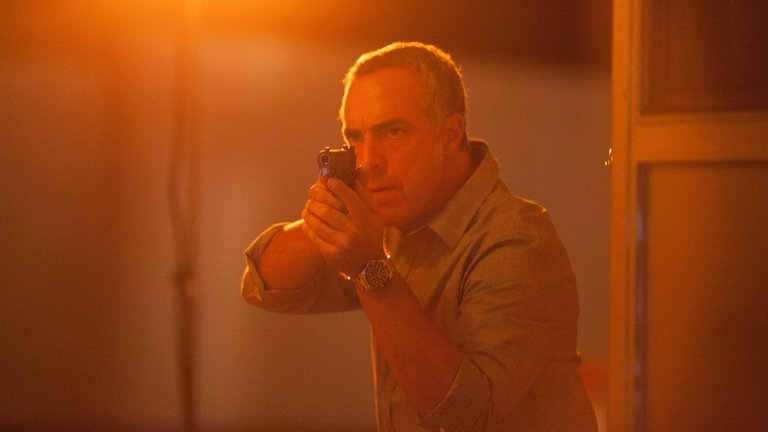Television Review: Bosch (Season 1, 2015)

The general rise in the quality of 2010s TV shows is more easily explained by sheer quantity than by some particularly inspired movement to serve audiences something better than what they’ve seen before. This same hyperproduction is also to blame for many of the series, often despite the efforts of their creators, starting to resemble one another, and even those that should represent major innovations or special events simply evoke a “déjà vu” effect among viewers. This happened, among other things, to Amazon after it launched Bosch, its first in-house drama series.
The series is based on a series of popular novels by Michael Connelly, an American author who has enjoyed a reputation as one of the most successful crime-fiction writers for over two decades, though his work had largely been ignored by Hollywood producers as material for screen adaptations (with the exception of Clint Eastwood’s Blood Work and The Lincoln Lawyer, starring Matthew McConaughey). The titular protagonist is Hieronymus “Harry” Bosch, a police detective who, over two decades of service, has seen it all on the streets of Los Angeles, but who also developed emotional scars long before, due to the death of his mother—a prostitute—and his upbringing in foster homes. At the start of the series, during an attempt to apprehend a suspect in a serial murder case, Bosch kills the suspect, and two years later, the incident becomes the subject of a civil lawsuit that lands Bosch in disfavour with his superiors, draws unwanted media attention, and complicates his job. Bosch confronts this early on while investigating a new case, after the discovery of bones points to a possible child murder committed twenty years prior. The investigation draws in Raynard Waits (Jason Gedrick), a convicted serial killer who, from his prison cell, begins claiming he committed the crime—a claim Bosch starts to doubt.
Behind the series is Eric Overmyer, one of the most experienced TV screenwriters and producers, known, among other things, for his close collaboration with David Simon on The Wire. The influence of that show can be seen not only in the casting of actors who shone in The Wire (Jamie Hector and Lance Reddick playing Bosch’s partner and a politically connected superior, respectively) but also in the structure. The first season of ten episodes does not tackle individual cases per episode; instead, the script weaves together plots from several of Connelly’s novels into an interconnected whole, with several cases interlinking. Overmyer uses this structure to delve deeply into Bosch’s character and, through other characters, depict the world he inhabits—one where the daily battle against street crime is just part of the struggle, and where he must contend with predatory media, corruption, bureaucracy, and political intrigues.
However, inevitable comparisons to The Wire will be deeply detrimental to Bosch. While Simon’s series still looks unique, Overmyer’s work drowns in clichés, including some thought to be buried in the 20th century. This includes portraying the protagonist as a hardened, “tough” cop whose violent but effective methods create a rift with bureaucratic norms; Bosch, in the best tradition of Miami Vice, can afford luxuries beyond the means of ordinary mortals, such as a villa with a spectacular view of Los Angeles (though the writers have at least provided a somewhat plausible explanation for this). To this is added the irritating trope of a serial killer who clashes with the detective on a personal level. The “déjà vu” effect is amplified by the involvement of many talented actors whom audiences haven’t seen in decades, whose familiar faces seem, like many elements of the script, to have wandered into Amazon’s new series from a bygone era.
On the other hand, it would be unfair to say the creators of Bosch put in no effort, or that the casting was entirely off. This applies especially to Titus Welliver, one of Hollywood’s most distinctive character actors, who shines in his portrayal of the lead character. A pleasant surprise comes from Annie Wersching as an atypical policewoman who enters into a romantic relationship with the protagonist, concluding in a manner unconventional even by Hollywood’s standards. The same can be said for the protagonist’s relationship with his teenage daughter, portrayed with charm by Madison Lintz. Perhaps the most delightful surprise comes near the end of the season, when it turns out the creators reserved the conventional payoff for the penultimate episode, after which the finale’s plot resolves in a less spectacular but far more realistic manner. This creates enough manoeuvring space for improvements in the second season. Amazon’s big foray into producing drama series could have turned out far worse.
RATING: 6/10 (++)
(Note: The text in the original Croatian version is available here.)
Blog in Croatian https://draxblog.com
Blog in English https://draxreview.wordpress.com/
InLeo blog https://inleo.io/@drax.leo
LeoDex: https://leodex.io/?ref=drax
Hiveonboard: https://hiveonboard.com?ref=drax
InLeo: https://inleo.io/signup?referral=drax.leo
Rising Star game: https://www.risingstargame.com?referrer=drax
1Inch: https://1inch.exchange/#/r/0x83823d8CCB74F828148258BB4457642124b1328e
BTC donations: 1EWxiMiP6iiG9rger3NuUSd6HByaxQWafG
ETH donations: 0xB305F144323b99e6f8b1d66f5D7DE78B498C32A7
BCH donations: qpvxw0jax79lhmvlgcldkzpqanf03r9cjv8y6gtmk9
Congratulations @drax! You have completed the following achievement on the Hive blockchain And have been rewarded with New badge(s)
Your next target is to reach 5200 posts.
You can view your badges on your board and compare yourself to others in the Ranking
If you no longer want to receive notifications, reply to this comment with the word
STOPCheck out our last posts: